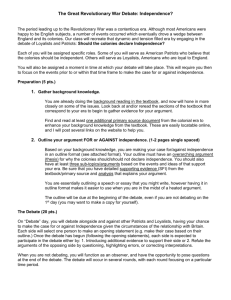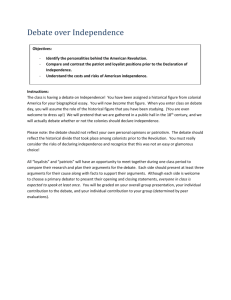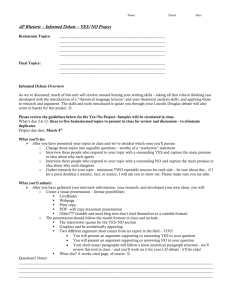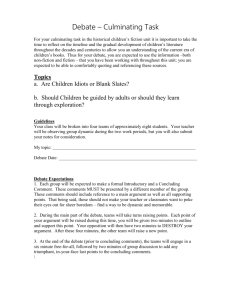The Great Revolutionary War Debate
advertisement
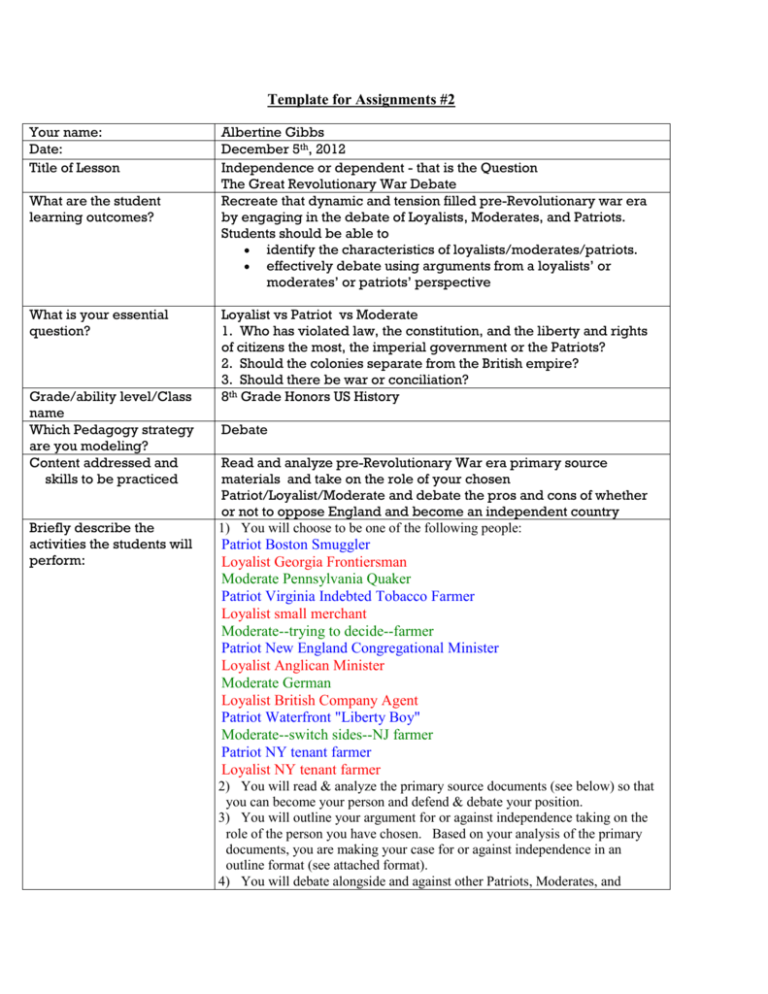
Template for Assignments #2 Your name: Date: Title of Lesson What are the student learning outcomes? What is your essential question? Grade/ability level/Class name Which Pedagogy strategy are you modeling? Content addressed and skills to be practiced Briefly describe the activities the students will perform: Albertine Gibbs December 5th, 2012 Independence or dependent - that is the Question The Great Revolutionary War Debate Recreate that dynamic and tension filled pre-Revolutionary war era by engaging in the debate of Loyalists, Moderates, and Patriots. Students should be able to identify the characteristics of loyalists/moderates/patriots. effectively debate using arguments from a loyalists’ or moderates’ or patriots’ perspective Loyalist vs Patriot vs Moderate 1. Who has violated law, the constitution, and the liberty and rights of citizens the most, the imperial government or the Patriots? 2. Should the colonies separate from the British empire? 3. Should there be war or conciliation? 8th Grade Honors US History Debate Read and analyze pre-Revolutionary War era primary source materials and take on the role of your chosen Patriot/Loyalist/Moderate and debate the pros and cons of whether or not to oppose England and become an independent country 1) You will choose to be one of the following people: Patriot Boston Smuggler Loyalist Georgia Frontiersman Moderate Pennsylvania Quaker Patriot Virginia Indebted Tobacco Farmer Loyalist small merchant Moderate--trying to decide--farmer Patriot New England Congregational Minister Loyalist Anglican Minister Moderate German Loyalist British Company Agent Patriot Waterfront "Liberty Boy" Moderate--switch sides--NJ farmer Patriot NY tenant farmer Loyalist NY tenant farmer 2) You will read & analyze the primary source documents (see below) so that you can become your person and defend & debate your position. 3) You will outline your argument for or against independence taking on the role of the person you have chosen. Based on your analysis of the primary documents, you are making your case for or against independence in an outline format (see attached format). 4) You will debate alongside and against other Patriots, Moderates, and Loyalists, having your chance to make the case for or against Independence. What selection(s) for primary sources have you chosen and why? What graphic organizers or visual tools will you use to help students to organize the information? Describe how you will assess prior knowledge and explicitly state how you will use this knowledge to differentiate instruction. Describe how students will demonstrate what they learn including the use of a least one pre/post assessment. How will students know the criteria for different levels of performance? What opportunities will List of Documents: Dulany, "Considerations" Dickinson, "Letters from a Farmer in Pennsylvania" Jefferson, "Summary View" Seabury, "Letters of a Westchester Farmer" Oliver, "Origin and Progress of the American Rebellion" Paine, Common Sense, "On Monarchy" Declaration of Independence Additional documents: Proclamation of 1763 Sugar Act Stamp Act Henry, Virginia Resolutions, 1765 Stamp Act Congress Resolutions Declaratory Act Townshend Duties Coercive Acts 1st Continental Congress, Declaration and Resolutions Wm Franklin, "Your Duty is to Guard and Preserve the Constitution and the Rights of Your Constituents" Henry, "Give Me Liberty or Give Me Death" Declaration of the Causes and Necessities of Taking Up Arms Declaration of Rebellion R. H. Lee, Resolutions for Independence, June 1776 Dickinson, "Arguments Against Independence" Independence, Letter of J. Adams 1) Primary Document Analysis organizer 2) Revolutionary War Debate Outline 3) Debate Outline & Argument Rubric Pre-assessment is an individual “brainstorming” using the circle mindmap (see attached). Based on the pre-assessment, supplemental materials may be made available to students who lack the foundation information. Students will demonstrate their learning by: 1) completing the pre-assessment 2) Completing the analysis of primary source documents 3) Completing the Revolutionary War Debate Outline 4) Participating in the Debate 5) Following the Debate Outline & Argument Rubric Debate Outline & Argument Rubric Reading & analyzing primary source documents, formulating a students have to perform adult work? (i.e. real world application) positin with evidence from the research, assuming the role of a listed period individual and debating with fellow studetns. Name:___________________________ Date:__________________________ Analysis of Primary Source Documents Debate (1) Up until 1766 A Fragile Peace, 1750-1754; The Seven Years’ War in America, 1754; The End of French North America, 1760-1763; Friction Among Allies, 1760-1763; The Writs of Assistance, 17601761; The Sugar Act, 1764; The Stamp Act, 1765; Resistance to the Stamp Act, 17651766 (2) 1766-1769 The Declaratory Act, 1766; Ideology, Religion, and Resistance; Opposing the Quartering Act, 1766-1767; The Townshend Duties, 1767; The Colonists’ Reaction, 1767-1769; “Wilkes and Liberty, 1768-1770; Customs Racketeering, 17671768 ((3) 1770-June 1775 The Boston Massacre, 1770; Lord North’s Partial Retreat, 1770; The Committees of Correspondence, 1772-1773; Women and Colonial Resistance, Backcountry Tensions, Liberty for Black Americans; The Tea Act, 1773; The Coercive Acts; The First Continental Congress; From Resistance to Rebellion; Common Sense Patriots Moderate Loyalists Name:___________________________ Date:__________________________ Revolutionary War Debate Outline Person: ___________________________________________________________________ I. Thesis:_________________________________________________________________ _____________________________________________________________________ __________________________________________________________________ II. Sub-Topic/Reason #1:__________________________________________________ a. b. c. d. e. f. Evidence1: (paraphrased info, primary source quotations) Analysis2 (Explain how this proves your for/against independence) Evidence (paraphrased info, primary source quotations) Analysis (Explain how this proves your for/against independence) Evidence (paraphrased info, primary source quotations) Analysis (Explain how this proves your for/against independence) III. Sub-Topic/Reason #2: _________________________________________________ a. Evidence3: (paraphrased info, primary source quotations) b. Analysis4 (Explain how this proves your for/against independence) c. Evidence (paraphrased info, primary source quotations) d. Analysis (Explain how this proves your for/against independence) e. Evidence (paraphrased info, primary source quotations) f. Analysis (Explain how this proves your for/against independence) IV. Sub-Topic/Reason #3: _________________________________________________ a. Evidence (paraphrased info, primary source quotations) b. Analysis (Explain how this proves your 1st argument) c. Evidence (paraphrased info, primary source quotations) d. Analysis (Explain how this proves your 2nd argument) e. Evidence (paraphrased info, primary source quotations) f. Analysis (Explain how this proves your 3rd argument) V. Conclusion a. Final points/arguments 1 Evidence should be factual information. It can be the 5Ws, paraphrased information from the text book, or primary source quotations. 2 Analysis explains how the evidence proves your argument. Why did you tell me that information? (This shows, This proves, therefore) In this case, how does this prove the colonies should/should not declare independence. 3 Evidence should be factual information. It can be the 5Ws, paraphrased information from the text book, or primary source quotations. 4 Analysis explains how the evidence proves your argument. Why did you tell me that information? (This shows, This proves, therefore) In this case, how does this prove the colonies should/should not declare independence. Debate & Outline Rubric 1 I cannot understand the Debate &/or Outline Organization because there is no sequence of information. 2 I have difficulty following the Debate &/or Outline because student jumps around. Student is Student does uncomfortable not have a with information grasp of and is able to Subject information; answer only Knowledge student cannot rudimentary answer questions. questions. Outline Student Student uses occasionally uses superfluous examples & examples/ evidence but they evidence or no do not really examples/ support the evidence in arguments made the Outline. in the Outline. Student debates with Eye Contact no eye contact & does not In Character maintain his/her character. Elocution (pronunciation) Student mumbles, incorrectly pronounces terms, and speaks too quietly for others to hear. Student occasionally uses eye contact during the debate & somewhat maintains his/her character. 3 4 Student presents Student presents information in a information in a logical, interesting logical sequence sequence which I which I can follow. can follow. Student Student is at ease demonstrates full with information & knowledge by answers answering all questions, but debate questions fails to elaborate. with explanations and elaboration. Student's examples & evidence relate to the arguments made in the Outline. Student's examples & evidence directly support the evidence made in the Outline. Student maintains Student maintains eye contact during eye contact & most of the remains in debate & character generally stays in throughout the character. debate. Student uses a clear voice and Student's voice is Student's voice is correct, precise low. Student clear. Student pronunciation of incorrectly pronounces most terms so that all pronounces words correctly. debaters can terms. Debaters Most debaters hear. have difficulty can hear Debate hearing. &/or Outline. Name:___________________ Pre-Assessment Frame: World Events American Revolutionary War Date:_________


